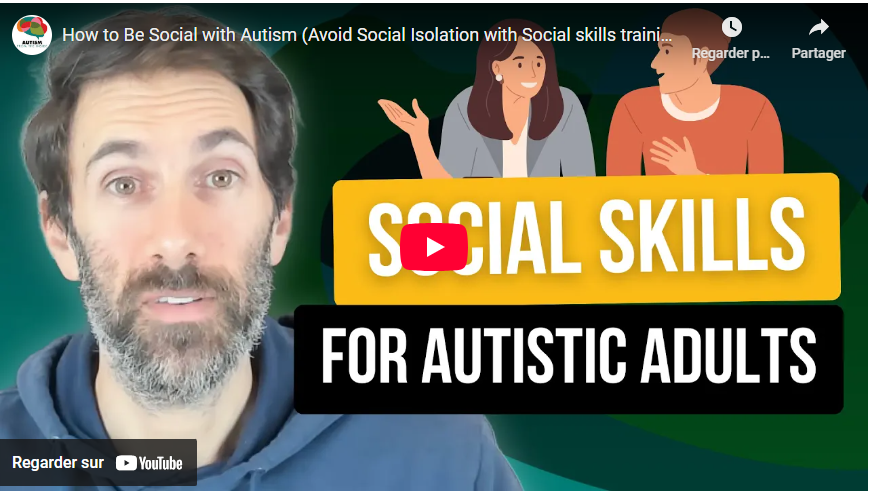Did you know that approximately 1 in 44 children in the United States is diagnosed with Autism Spectrum Disorder (ASD)? Despite this, many autistic individuals often feel isolated. Studies show that about 50% of autistic individuals report feeling lonely, and 65% express a desire to form friendships but struggle with social interactions.
This guide is here to help. It’s designed to provide essential strategies on how autistic individuals can make friends and build meaningful relationships. Whether you’re looking to connect with someone new or strengthen existing bonds, this article offers step-by-step instructions and emotional well-being tips tailored to your needs.
Friendship is a journey, and it’s okay to take your time. With the right support and planning, you can navigate social situations more confidently. Let’s explore how shared interests and structured settings can pave the way for lasting connections.
Table of Contents
Key Takeaways
- Approximately 1 in 44 children in the U.S. is diagnosed with ASD.
- 50% of autistic individuals report feeling lonely or isolated.
- 65% express a desire to make friends but face social challenges.
- Structured settings like clubs or groups are preferred for forming friendships.
- Shared interests are a key factor in building lasting relationships.
Understanding Social Isolation and Its Impact on Relationships
Social isolation can feel like an invisible barrier, especially for those on the spectrum. It’s more than just being alone; it’s a deep sense of disconnection from others. This feeling can affect your emotional health and make it harder to build meaningful relationships.
Recognizing the Signs of Social Isolation
Social isolation often shows up in subtle ways. You might find it hard to start or maintain a conversation. Sensory overload in busy places can also make social settings overwhelming. These signs are common but recognizing them is the first step toward change.
For many, small talk feels like a challenge. Misreading social cues can lead to misunderstandings. These situations can make you feel isolated, even when you’re around others. Understanding these signs can help you take steps to improve your social life.
Challenges of Social Interaction as an Autistic Person
Social interaction can be complex. Sensory sensitivities, like loud noises or bright lights, can make public spaces uncomfortable. Executive functioning challenges might make it hard to organize social plans or manage responsibilities.
Here’s a quick look at some common challenges:
| Challenge | Example |
|---|---|
| Sensory Overload | Feeling overwhelmed in crowded places. |
| Misreading Cues | Not understanding sarcasm or body language. |
| Small Talk | Struggling to keep casual conversations going. |
“Understanding your challenges is the first step toward building stronger connections.”
These challenges can feel isolating, but they don’t define your ability to form friendships. With the right support and strategies, you can navigate social situations more confidently. Recognizing these issues is key to improving your relationships and emotional well-being.
How autistic individuals can make friends
Building friendships can feel like a puzzle, but your unique experiences are the missing pieces. Every person’s journey to connection is different, and that’s okay. Embracing your authentic self can pave the way for deeper and more meaningful relationships.
Celebrate Your Strengths
Your experiences, interests, and passions are strengths, not weaknesses. Sharing these with others can create a bridge to understanding. For example, if you love art, joining a local art group can help you meet like-minded people.
Programs like the Subway Sleuths initiative show how shared interests can foster connections. These activities validate your unique social style and make it easier to bond with others.
Practical Steps to Start Conversations
Starting a conversation doesn’t have to be overwhelming. Focus on topics you’re passionate about. If you love movies, ask someone about their favorite film. This approach makes the interaction more natural and enjoyable.
Here’s a quick guide to initiating conversations:
| Step | Example |
|---|---|
| Find Common Ground | Ask about shared interests like hobbies or books. |
| Keep It Simple | Start with a casual question like, “What do you like to do for fun?” |
| Listen Actively | Show genuine interest in their responses. |
“Authenticity is the foundation of meaningful relationships, and your story matters.”
Unconventional Paths to Connection
Not every friendship follows a traditional path, and that’s okay. Online communities like Discord or Reddit can be great places to connect with others who share your interests. These platforms allow you to interact at your own pace.
Every day is an opportunity to work on your social skills. Whether it’s joining a group or attending an event, small steps can lead to big changes. Remember, genuine friendships take time to develop, and that’s perfectly normal.
Key for Building Meaningful Relationships
Every meaningful relationship starts with a few essential elements. These elements help create a strong foundation for lasting bonds. Whether you’re looking to connect with someone new or strengthen existing ties, understanding these components can make a big difference.

Essential Social Components and Interests
Shared interests are one of the most important component for building friendships. When you find someone who enjoys the same hobbies or activities, it’s easier to connect. For example, joining a book club or art class can help you meet like-minded people.
Consistency is another key factor. Regular group activities provide opportunities to interact and build trust over time. Studies show that participating in shared interests increases the likelihood of forming lasting relationships.
| Ingredient | Example |
|---|---|
| Common Interests | Joining a local hiking group. |
| Consistency | Attending weekly meetups. |
| Support Systems | Leaning on family or friends for advice. |
Leveraging Your Strengths and Support Systems
Your unique strengths are valuable assets in building relationships. Whether it’s your passion for a hobby or your ability to listen, these qualities can help you connect with others. Recognizing and sharing these traits can make social interactions more meaningful.
Support systems also play a crucial role. Family, friends, and community groups can provide guidance and encouragement. Online communities are another great option, offering a safe space to interact at your own pace.
“Strong friendships are built on trust, shared experiences, and mutual support.”
Choosing the right place and group can significantly improve your social experience. Look for environments where you feel comfortable and welcomed. Small steps, like attending an event or joining a group, can lead to big changes in your relationships.
Step-by-Step Instructions to Initiate Social Interactions
Taking the first step in social interactions can feel daunting, but preparation makes it easier. Whether you’re meeting someone new or joining a group, having a plan can boost your confidence and reduce anxiety. Let’s explore how to prepare for and navigate these moments successfully.

Planning and Preparing for New Encounters
Preparation is key to feeling comfortable in social settings. Start by identifying your goals. Are you looking to meet a new friend or strengthen an existing relationship? Knowing your purpose helps you focus.
Rehearsing conversation topics can also ease anxiety. Think about your interests and how they might connect with others. For example, if you enjoy movies, prepare a few questions about favorite films or genres.
| Step | Action |
|---|---|
| 1 | Identify your goal for the interaction. |
| 2 | Prepare a few conversation topics. |
| 3 | Practice in a low-pressure environment. |
Here’s a simple plan to get started:
Navigating Conversations and First Impressions
Starting a conversation doesn’t have to be overwhelming. Begin with open-ended questions like, “What do you enjoy doing in your free time?” This encourages the other person to share more.
Pay attention to body language. A smile or nod can show you’re engaged. If you’re unsure how to respond, take a moment to process before replying. It’s okay to pause and think.
Here are some tips for creating positive first impressions:
- Maintain eye contact to show interest.
- Use a friendly tone and body language.
- Listen actively and respond thoughtfully.
“Preparation and practice are the foundations of confident social interactions.”
Taking small steps, like attending a group event or joining an online community, can help you build confidence over time. Remember, every interaction is an opportunity to learn and grow.
Emotional Nutrition and Self-Care in Friendship Building
Building meaningful connections requires more than just social skills; it’s about nurturing your emotional health too. Just as your body needs proper nutrition, your mind thrives on emotional nourishment. Self-care is a vital part of this process, helping you stay balanced while forming and maintaining friendships.
Strategies for Sustaining Emotional Wellbeing
Emotional wellbeing is the foundation of healthy relationships. When you take care of yourself, you’re better equipped to connect with others. Start by incorporating small, consistent self-care practices into your day. These can include mindfulness exercises, journaling, or even a short walk.
Here are some actionable tips to sustain your emotional health:
- Set boundaries: Know when to say no to avoid overextending yourself.
- Practice mindfulness: Techniques like deep breathing can reduce stress and improve focus.
- Engage in hobbies: Activities you enjoy can recharge your energy and boost your mood.
Nutrition Disclaimer: Balancing Efforts and Self-Care
While building friendships is important, it’s equally crucial to balance your efforts with self-care. Overextending yourself can lead to burnout, making it harder to maintain relationships. Think of self-care as the emotional nutrition that fuels your ability to connect with others.
Here’s a simple guide to balancing social efforts and self-care:
| Activity | Self-Care Tip |
|---|---|
| Attending a social event | Plan a quiet evening afterward to recharge. |
| Joining a new group | Limit your participation to avoid feeling overwhelmed. |
| Engaging in conversations | Take breaks if you feel drained or anxious. |
“Self-care isn’t selfish; it’s essential for building and maintaining healthy relationships.”
Remember, it’s okay to take your time. Plan your day to include both social interactions and moments of personal recharge. Small, consistent self-care practices can make a big difference in your overall mental health and help you maintain long-term, healthy friendships.
Conclusion
Friendship is a journey shaped by your unique experiences and strengths. By embracing your interests and joining supportive groups, you can create meaningful connections. Each friendship, no matter how different, adds value to your life and helps you grow.
Understanding your place on the spectrum is key to thriving socially. The strategies in this guide, from initiating conversations to practicing self-care, are tools to help you succeed. Remember, every person’s path is unique, and that’s what makes it special.
With persistence and the right support, building lasting relationships is possible. Keep putting in the work, and celebrate the positive things that friendship brings. Your journey is yours to own, and every step forward is a victory.
FAQ
What are some signs of social isolation?
Signs include feeling lonely, avoiding social situations, or having few close relationships. It’s important to recognize these patterns to address them effectively.
What challenges might someone face in social interactions?
Challenges can include difficulty reading social cues, feeling overwhelmed in group settings, or struggling to start conversations. Understanding these hurdles can help in finding solutions.
How can unique experiences help in building friendships?
Sharing your interests and experiences can create common ground with others. It’s a great way to connect and show your authentic self.
What are key for meaningful relationships?
Trust, shared interests, and mutual support are essential. Leveraging your strengths and seeking supportive environments can also strengthen bonds.
How can you prepare for new social encounters?
Plan ahead by thinking of conversation topics or practicing in low-pressure situations. This can help reduce anxiety and boost confidence.
What strategies help sustain emotional wellbeing?
Setting boundaries, practicing self-care, and balancing social efforts with personal needs are crucial for maintaining emotional health.
How can you navigate conversations effectively?
Focus on active listening, ask open-ended questions, and share your thoughts genuinely. These steps can help create a positive first impression.
